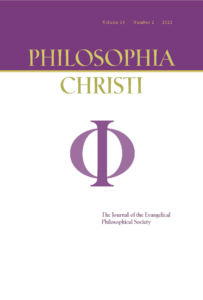Access the Latest Philosophia Christi Issue!
Get immediate digital access to the latest issue of Philosophia Christi (vol. 25, no. 1) by subscribing today via the Philosophy Documentation Center. In fact, for as low as $25/yr, your digital only subscription to the journal includes the current issue and the entire archive of Philosophia Christi articles, philosophical notes, and book reviews since 1999 (over 1150 items to search, browse, and access)!
From the latest issue, enjoy the following preview!
Ross D. Inman
Articles
Christopher E. Franklin
How Literature Educates the Emotions
I aim to show that the practice of reading excellent literature is an excellent form of moral education. I offer a two-stage defense. First, I call attention to central features of the human self (especially the emotions) involved in moral growth. I argue that the central components of emotions are construals (or ways of seeing) and loves. Second, I show that literature has distinctive resources both to train our construals by affording us practice in seeing the world in new ways and to cultivate our loves by affording us practice in imitating the loves of others.
R. T. Mullins
Theism Does Not Give Birth to Idealism
Sam Lebens offers an intriguing set of arguments from theism to idealism. In this paper, I shall focus on the argument from perfect rationality to Hassidic Idealism. I will offer a critical analysis of this argument and draw out a series of conflicts between Hassidic Idealism and divine freedom, the divine ideas, and creation ex nihilo.
Samuel Lebens
Creation and Modality: A Response to Ryan Mullins
Ryan Mullins argues that, assuming Hassidic Idealism, God is forced to create all possible worlds (either as a single all-inclusive multiverse, or as an exhaustive array of discrete possible worlds, no one of which is more inherently actual than the other). This process, because unfree, doesn’t amount to creation so much as emanation. I argue that there are numerous ways to reconcile Hassidic Idealism with a robust doctrine of a free Divine creation ex nihilo. We must distinguish between a God who thinks a world into being, and One who, as in the book of Genesis, speaks it into being.
Colin Runoff
The X-Claim Debunking Argument and Theistic Mooreanism
According to Stephen Law’s “X-claim argument,” the theist’s acquiring (what I call) an “x-claim defeater” automatically provides the theist with a reason to give up her x-claim belief. Contrary to Law, I argue that, even if the theist acquires such a defeater, it does not follow that the theist ought to give up her x-claim belief. This is because the degree of justification possessed by the theist’s belief may be sufficient to epistemically insulate itself against the x-claim defeater that was initially brought against it. Hence, the theist may be justified in maintaining her x-claim belief.
Philosophical Notes
Matthew Owen
Analyzing Leidenhag’s Minding Creation
Joanna Leidenhag’s research monograph Minding Creation: Theological Panpsychism and the Doctrine of Creation argues that theologians should seriously consider and perhaps even support panpsychism. In light of rekindled interest in panpsychism amongst philosophers of mind and a noteworthy minority of cognitive neuroscientists, which comes in the wake of physicalism’s faltering, Leidenhag’s thesis is timely. This work briefly analyzes some key aspects of Minding Creation.
Joel Ballivian
Review of Copan and Jamison, What Would Jesus Really Eat?: A Review Essay
Paul Copan and Wes Jamison’s recent book, What Would Jesus Really Eat?, attempts to offer moral and theological vindication for the factory farm industry and, more generally, for eating animals. It thereby aims to provide “comfort” for Christians to “overlook animal suffering” and, if they choose, to continue eating factory-farmed meat. In this review, I argue that various key arguments in the book rest on questionable premises and elide relevant distinctions. As a result the key thesis of the book—that Christians are permitted to eat meat, including from factory farms—has not been vindicated over against arguments to the contrary. I finish by offering a few strategies for pursuing a more conscientious diet and suggest that Christian philosophers can do more to serve the aims of conscientious consumption.
Robert A. Larmer
Koperski’s New (Improved?) Decretalism
In “Breaking Laws of Nature” published in this journal in 2017, Jeffrey Koperski defended a position he termed “decretalism” in which he claimed that the laws of nature should be understood as the decrees of God. In “Decretalism and the Laws of Nature” also published in this journal in 2017, I argued that Koperski’s decretalism amounts to occasionalism. In his recent book, Divine Action, Determinism, and the Laws of Nature, Koperski has responded to my criticisms by changing his account of the laws of nature. In this article, I argue that his new account of the laws of nature is more problematic than his first rendition.
Jeffrey Koperski
Decretalism is (Still) Not Occasionalism: Reply to Larmer
In “Koperski’s New (Improved?) Decretalism,” Robert Larmer argues that my version of nomological realism about the laws of nature logically entails occasionalism. Here I clarify and defend my view against this charge. The main disagreement is whether a proper account of the laws of nature must involve dynamic production—what is commonly called oomph.
Book Reviews
K. Lauriston Smith
Thomas W. Duttweiler
Philosophical Essays against Open Theism, edited by Benjamin H. Arbour
Andrew Hollingsworth
Analytic Theology and the Academic Study of Religion, by William Wood
Reminder!
For as low as $25 a year, you can sign-up for EPS membership (includes print copies of the journal, access to annual and regional meetings, opportunities to present conference papers, and more).


